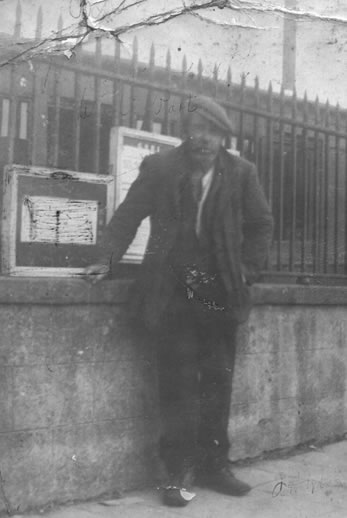|
|
The Story of Bob Devitt
A Rediscovered Photograph
The following excerpt from chapter one of "The Kindly Spot" lays the foundation for what follows:
There was, in those days, another figure whose appearance on the
street caused commotion and conflicting feelings among young and
old. This was Bob Devitt, an itinerant, a tramp, not one of the tinker
class but cut from a different cloth. Bob was a big hulk of a man,
bearded, clear eyed, keenly observant, hobnail booted, fearsome in
appearance to youngsters, but a gentle giant to their parents. In all
weathers he wore a variety of shabby overcoats, and carried an
enormous sack slung over his shoulders.
Bob was treated cruelly by the young boys of the town. For
whatever reason, myth, rumour, gossip, it was widely believed that
Bob never spent a shilling, a sixpence, or even a penny of the charity
extended to him by the good people whose houses he entered on his
twice a year pilgrimage through all the towns, villages, and farmlands
scattered throughout Donegal and a couple of neighbouring counties.
They believed he carried his booty in the great sack on his back, or
cached it from time to time in tin cans hidden in hedges or stone
fences by the roadside. And whenever Bob appeared, as if by magic
there appeared too a crowd of boys, running in front of him and
teasing, "Bob, spare a fiver? Bob, change a fiver?"
A "fiver" was a £5 note, a huge sum of money when the average
weekly country wage was less than half of that.
It was enough to drive any sane man crazy and it always infuriated
poor Bob, who would shout and roar back, and flail at the dancing
circle of young devils who always slipped safely out of the reach of
the ashplant that he carried as a walking stick and used for his own
protection from man and animal.
Eventually parents would appear, themselves as angry as Bob with
their children, and haul them back indoors, leaving Bob to proceed in
peace on his travels.
Bob was welcome in many houses, and seemingly more so in the
homes of those who were not particularly affluent themselves. Many
people thought it was lucky to have Bob visit their homes and cross
their threshholds. Sitting at the kitchen fire or kitchen table, the gentle
giant could talk at any level on many subjects. If he spotted a guitar
or violin in the house, his talk would be on music. If there were many
books to be seen, then he would talk of reading and literature. If
there was a new baby in the house, Bob, an ogre to the older
brothers and sisters, could somehow coax a smile and a gurgle of joy
from the infant.
Bob's was a hard life. His roof was the sky, summer or winter, his
bed under a hawthorne tree in wet weather, or in an open roadside
ditch when it was dry. At night his many coats kept him warm in
spring, summer and autumn, and in winter he padded his chest, legs
and arms with package after package of crumpled newspaper that he
carried in his great big sack. There are many still alive who can tell of
seeing Bob fast asleep on a winter's morning in a roadside ditch,
swathed in newspapers, the unmelted snow lying on his beard, while
he snored away blissfully, wrapped in the arms of Morpheus.
What his origins were, nobody could swear. He took his secret with
him. Some thought he had been a candidate for the priesthood whose
mind had snapped during the course of his studies. After his death a
distant relative was discovered, as I remember somewhere in the
Midlands, but even that was obscure. The tins of money were never
found, and Bob had a pauper's burial. Only those who really cared
were present.
Sifting through some Internet files, a photograph of Bob Devitt recently came to light.
It had been sent to me by a reader in Texas, U.S.A., whose father, an emigrant from Ballyshannon, had preserved it for many, many years. Unfortunately, a computer erasure destroyed the correspondence accompanying it, leaving only the recollection that the father had been an officer of the Ancient Order of Hibernians in Texas.
That photograph of Bob Devitt may be the only one in existence, and I am impelled to reproduce it, both to preserve his memory and to demonstrate once again the efficacy of the Internet as an instrument in preserving the social history of our times.
It shows Bob standing outside the railings of the Market Yard in Ballyshannon. It could serve as a prototype of "The Tramp with a whiskery face" in Quentin Blake's children's book "Patrick".
And I wish to make one correction in the original story. As related to me by my late friend and colleague, reporter Hugh Daly, only one person attended Bobís burial.
May Bob and my friend Hugh both rest in peace.

Bob Devitt
"The sky was his roof"
Home
| About
| Canadian Vindicator
| Literature
| Gallery
| History
|
|

